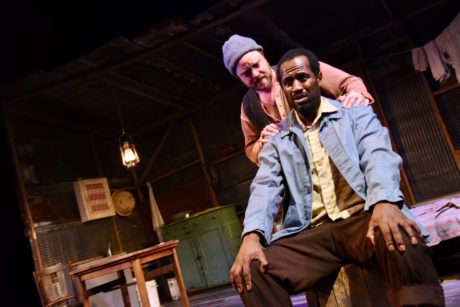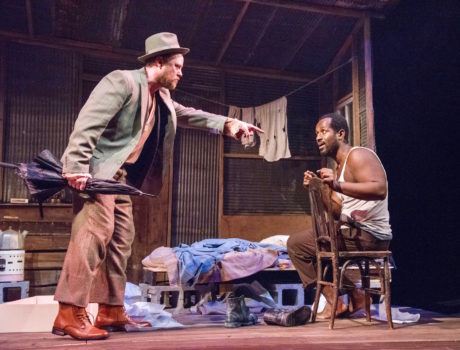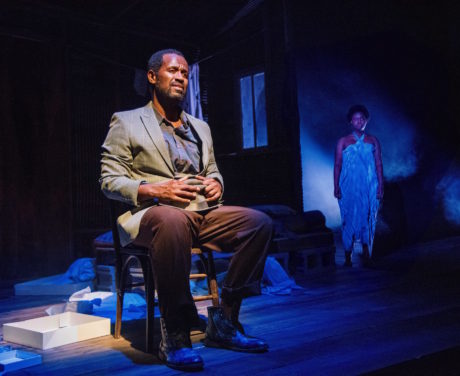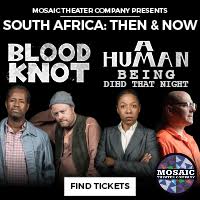Until I saw Blood Knot at Mosaic Theater Company, I knew the work of Director Joy Zinoman only by reputation. I had come to her legend late. And the production blew me away.
Set in apartheid South Africa, Athol Fugard’s Blood Knot tells the story of two brothers: Morris, who is so light-skinned he can pass as white (played by Tom Story), and Zachariah, who is very dark-skinned (Nathan Hinton).
“I like directing a play that’s got only men in it, and that’s written by a man,” Zinoman has said. “I believe that sensibilities of opposition, or oppositional sensibilities, can sometimes yield, can mine all kinds of depths.”
So it was that two aspects of her direction of Blood Knot jumped out at me. One is how she dealt with Morris’s complicated and hidden sexuality. The other is her introduction of a third actor onstage as the brothers’ mother, a part not in the script. Both directorial choices seemed to me grounded in Fugard’s text, yet at the same time they amplified the play in an amazing way.
Intrigued, I asked to talk with her. I was thrilled that she agreed.

John: You said in an interview with my friend Christopher Henley,
I am not someone whose first interest in the theatre is political. I’m interested in the theatre which first of all is human; which first of all is about character.
I admit I do have a political bent, and it seemed to me that in directing Blood Knot, which is a work about racial politics, you found a way to shed light on the play’s sexual politics, and then those sexual politics in turn illuminated the play’s racial politics.
Joy: It’s not that I’m not interested in politics. I’m seriously interested in politics. But I believe what the theater does best is first get people to feel and then think afterwards. I’m not interested in an intellectual theater whereby people first think. I want them to be moved, because only when you as audience member are vulnerable can you then have thinking which is possibly going to effect change.
I completely agree. And I was one moved. So I’d like to start with the character Morris. You’ve said you knew from the start you wanted Tom, and he disappears into the role brilliantly.
Yes.
What were your discussions about Morris and his sexuality? Clearly Morris’s sexuality is very different from his brother’s. Zachariah lets it all hang out.
That’s right.
But what is it, and how was it to be played?
One of the reasons I was attracted to Tom as an actor is because he’s played a lot of characters who in a contemporary sense are gay. Morris is not gay in a contemporary sense. This is 1961. He is unaware of gay life as a lifestyle.
There are three references describing Morris’s strangeness sexually, and they’re all from Zachariah. He doesn’t go so far as to say it is aberrant, but he brings the point up in three very pointed ways. Zachariah says, “You dress, you get undressed like a woman. Haven’t you been with a woman, you who’ve traveled the whole world?”
The only thing Morris says in response to Zachariah’s proddings—and it’s when Zachariah has fallen asleep—is “I touched the other thing once.” That’s an extremely important line. I believe that if Morris was alive today, 56 years later, he would be a gay man. However in that period I don’t think he associates even as a homosexual. I think what he is, is a romantic. He likes poetry. Things that are considered sensitive, not manly. He’s a person who sees himself being spiritual or religious.
Morris’s sexuality is very complex, and I am not the only person to think long and hard about it. There’s quite a bit written about it, as a matter of fact. And as director and actors, we often create character biographies, so in the case of Morris we created a life for him in the ten years that he was away from Port Elizabeth.
I think probably in those ten years something did happen, some sexual thing happened, that did drive him back to Port Elizabeth, in addition to his guilt over leaving his brother. We postulated that maybe he was longing for some woman and tried to enter into a relationship and then found that he couldn’t consummate the relationship or wasn’t attracted in a sexual way, really more in a romantic way—and that upset him and humiliated him, and he was a failure in that as in other things.
Morris’s response to Zachariah’s prodding sexually is he doesn’t answer, he never answers. And Fugard leaves it that way, very mysterious. He could easily have written one line that would have clarified but he chooses not to. And I think that’s because of the period.
I’m curious to know what you have heard since the show opened about how audiences are perceiving and responding to that fact of Morris’s character here and now.
I’m very, very interested in that question, and in what people think. I think that for most people they see the sexual ambivalence in this character. I think Fugard puts it there as a character contrast to Zachariah, who raped his girlfriend Connie and says he wants “woman.” He makes Morris be at the very least ascetic and at the very most a clear homosexual. It’s very effective dramaturgically.

I found Morris’s nurturing gestures toward Zachariah very moving and tender: his tending to his brother’s sore feet, his saving money for their future, even his plan to help his brother find a woman by finding him a pen pal. Morris loves his brother, right?
Well, I think they love each other. I also think that the play is homoerotic. I want it to be, and I believe it is. That is not a conscious textual thing, but I believe it’s very palpable. I mean, you have two attractive men on stage together who are brothers bound in blood. They are antagonistic, but they are also tremendously loving to each other.
I’m curious how the homoeroticism of the play connects to the dramatic transformation that happens in Act Two, which comes as a disturbing shock. Even if you know it’s coming, that scene is wrenching to watch: Morris dons a white man’s outfit and begins to behave toward his brother as a vicious white supremacist abusing a despised underling. And this conversation we’ve been having prompts a question that might sound politically incorrect but I think has to be asked—
The play is politically incorrect.
Yes. And my question is: To what extent does Morris’s sudden aggression toward the brother whom he loves come out of his repressed homosexuality? Is this attack in some way like twisted payback or reprisal for unrequited passion? Or is it like Morris’s first experience being a sexual top, being a dominant alpha, uncontaminated by his effeminacy, clearing himself of anything queer?
I don’t believe it is that direct; I think it is indirect. I think that for Fugard it is a racial thing first. I think that what Fugard believes is that violence is inevitable in South Africa—as in the scene where Morris is praying and Zach comes up behind him holding a chair over his head, which is a climactic moment of their game playing.
When Morris puts on the magic jacket and the magic hat—which in rehearsal I called “white drag”—he becomes someone else. With that phallic umbrella prop, he says to Zachariah, “I wanted to poke you.” Clearly there’s also sexual imagery when he asks Zachariah whether he’s black “all over, my boy?…your pits and privates?” There’s sexual imagery throughout the play, and it’s something that I’m very, very attuned to and interested in. But I don’t believe that Morris’s primary action when he puts on the white drag is to be a sexual being. I think its primary assault is as the white overseer.

To me what it looked like was an overlay of male sexual sadism on the hierarchy of race hate. Another kind of knot that can’t be untied, that Blood Knot as a play cries out about.
I think that all interpretations in the eye of the beholder are valid. So I wouldn’t argue with your interpretation. I’m just saying that is not what I intended.
Sure.
But I’m deeply interested in the hidden, soaking, sweat-filled homoeroticism of the play.
Along those lines, why did Zachariah play along with the race game at first? He’s not immediately put off by it.
Not only does he play along with it; he ups the stakes of it. He forces it. He foments it. Morris doesn’t want to put on the coat. Morris puts on the hat and rips it off immediately. Zachariah pushes the game, not Morris.
The first game is the car game at the end of Act One, their wonderful memories of car rides. The second game is when Morris interrogates Zach in the second act: “What are the facts? What are the facts?” It’s a very powerful section, a precursor to the violence. At the end of it Zach has that great outburst speech in which he says, “I am black. I am black.”
After that racial transformation/acceptance moment happens, the play shifts and the game shifts and Zachariah drives most of the games. He’s the one who tells Morris to put the clothes on. He’s the one who instigates. The only game that Morris initiates is the game in which they kill the mother—that throwing-stones-at-the-woman game—which is a really weird part of the play. The necessity to scapegoat and kill the memory of their mother allows them to go on.
You bring up the mother, a figure you introduced into what you have called this “very male play.” Before I ask you what that choice meant to you, I’d like to say what it meant to me, if that’s okay.
Yes, yes.

There’s this dreamlike figure who appears intermittently outside the brothers’ shack in a kind of memory light. She’s played by Anika Harden; the program identifies the character as Woman. We don’t know who she is or why she’s there or even where she is. There’s bluish side lighting and stage haze so maybe she’s an apparition but we’re not sure. And then suddenly we get it. And that moment just rocked me. This is the mother who bore both brothers, the mother they have in common but they each have different memories of, as siblings always do, the one from whose body flowed the blood knot that tethers them together and to her.
You made her viscerally present on stage.
By contrast the young girl pen pal Morris writes to on Zachariah’s behalf really is a fantasy. She figures in the plot; she writes back and says she’s coming for a visit. But as a character she is more a projection of the brothers’ imaginations; she’s who they want her to be. Meanwhile the presence of the mother is flesh-and-blood. She lives in the brothers’ memories as a real woman and she lived her own life as one. The silent presence of her in that tattered blue dress just spoke volumes to me—
I love that so much, because— It’s not in the play at all.
No, I know. That’s why it blew me away. This figure reminds us, maybe subconsciously, that even as men go on making up fantasy women, there is a real woman behind every man.
Well, I love that you got that, because it was a very controversial thing to do.
There are many, many reasons that I did it. I saw a production of a lost Lorraine Hansberry play at the National Theatre in London a couple of years ago, and there were some apparitions haunting around, and I was very taken with the idea.
For me the mother is haunting this house where these boys live, but she’s also a little bit of Mother Africa. There are many, many characters in the play that we don’t see. There’s Connie the girlfriend. There’s Ethel the pen pal. There’s the two other discarded pen pals. Those characters are very, very important and real. We spent a lot of time in rehearsal talking and making those characters palpable. So it was a risk to single one out.
I was very worried about it. I changed it a lot. I changed what she did. Even up to the day before opening I changed how much time she spent out there.
During the monologue in scene six when Morris directly addresses his mother, I had her turned away until when he says, “Ma. Ma,”and she turns to him. Zach has this great monologue asking his mother, “Who did you really love?” And then there’s the killing of the mother, the stoning of the mother. And so I felt the mother is a very powerful presence throughout the play. And because of all that textual commitment that Fugard made, I felt it was justified in having this dream presence haunting their house.
Plus, I’m a woman and I’m directing a play by a man with male characters, and I felt the opposition of that female presence could shed some light on that male relationship.
Well, my heart applauds you for that choice. And there seems to me an important takeaway for other directors in what you have done at Mosaic with Blood Knot—in how you’ve chosen to portray the character of Morris, how you’ve realized the character of the mother onstage.
You know, I teach directing, and I do believe that you should not work on material that you don’t have a real feeling for. You can’t do a play, or you shouldn’t do a play, where when you read it it doesn’t produce visual images in your mind. A play is just like scratch marks on paper. That has no relation to palpable, flesh-and-blood imagery. You’ve got to take these scratches on paper and make them real. When I read Blood Knot I was overwhelmed with imagery, including the image of the mother. For me when you have that impulse to action, impulse to physicalization, then that’s a suitable project for you.
Running Time: Two hours and 10 minutes, with one 15-minute intermission.
Blood Knot plays in rep with A Human Being Died That Night through April 30, 2017, at Mosaic Theater Company of DC performing at the Atlas Performing Arts Center – 1333 H Street NE, in Washington, DC. For tickets, call the box office at (202) 399-7993 ext. 2, or purchase them online.
LINKS:
Review: ‘Blood Knot’ at Mosaic Theater Company of DC by Ravelle Brickman.
Review: ‘A Human Being Died That Night’ at Mosaic Theater Company of DC by John Stoltenberg.
Spine: ‘A Human Being Died That Night’ at Mosaic Theater Company by Robert Michael Oliver.





